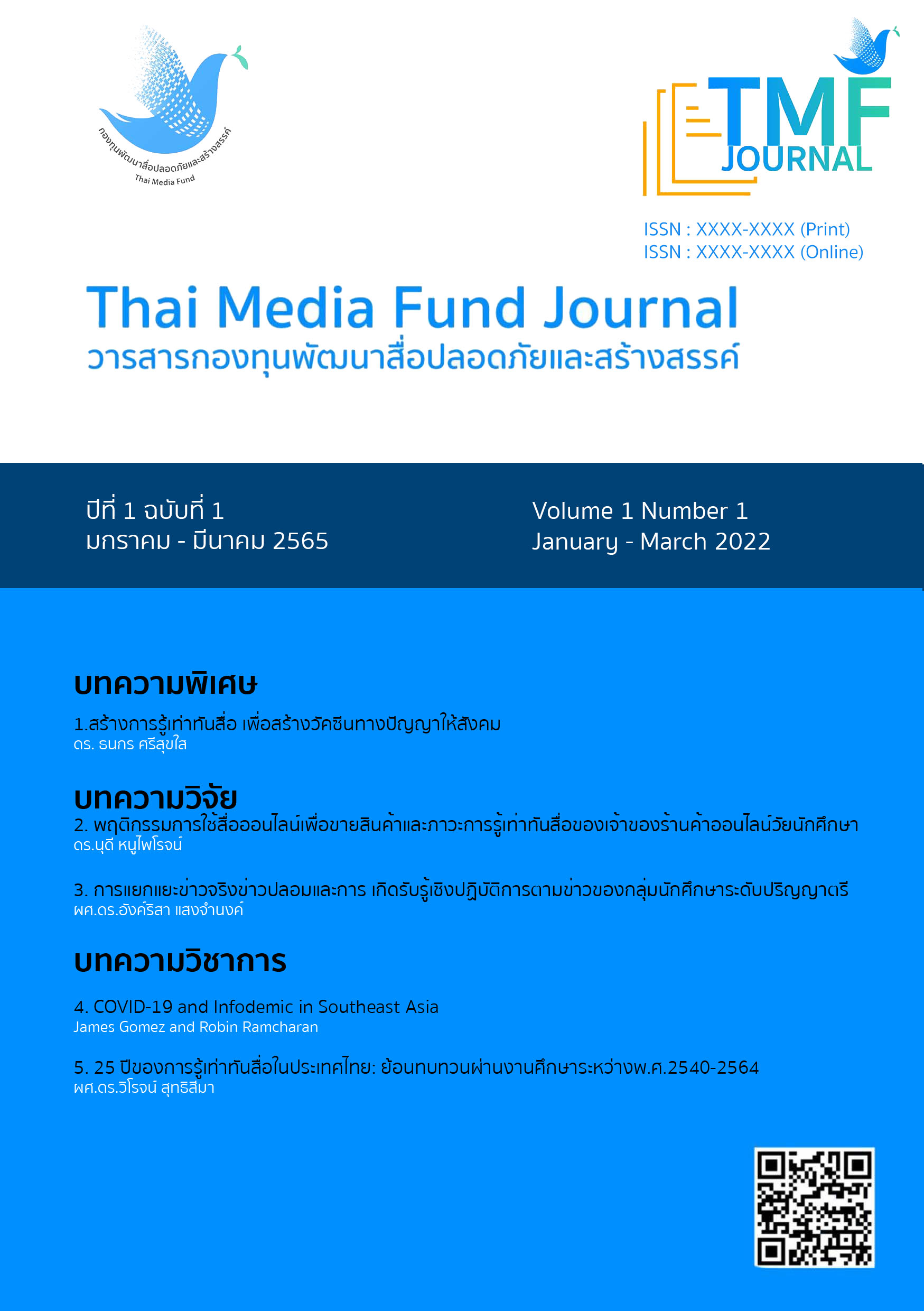พฤติกรรมการใช้สื่อออนไลน์เพื่อขายสินค้าและภาวะการรู้เท่าทันสื่อของเจ้าของร้านค้าออนไลน์วัยนักศึกษา
Main Article Content
บทคัดย่อ
งานวิจัยนี้มีวัตถุประสงค์เพื่อศึกษาพฤติกรรมการใช้สื่อออนไลน์เพื่อขายสินค้าและภาวะการรู้เท่าทันสื่อของเจ้าของร้านค้าที่เป็นนักศึกษาระดับปริญญาตรีในสถาบันอุดมศึกษาในเขตกรุงเทพมหานคร โดยใช้ระเบียบวิธีวิจัยเชิงปริมาณด้วยแบบสอบถาม ผลการสำรวจพฤติกรรมการใช้สื่อออนไลน์ของกลุ่มตัวอย่างจำนวน 400 รายพบว่ากลุ่มตัวอย่างขายสินค้าในกลุ่มเครื่องสำอาง น้ำหอม และอาหารเสริมมากที่สุด รองลงมาคือสินค้าในกลุ่มเครื่องแต่งกาย เครื่องประดับและกระเป๋า โดยส่วนใหญ่ใช้เวลา 1-3 วันต่อสัปดาห์ในการขาย และมีส่วนน้อยที่จะขายของทุกวัน ซึ่งในแต่ละครั้งใช้เวลาในการขายของไม่เกิน 30 นาที โดยทำการค้าขายผ่าน เฟซบุ๊คมากที่สุด รองลงมาคือไลน์ และอินสตาแกรมตามลำดับ และเข้าถึงช่องทางการขายออนไลน์ด้วยโทรศัพท์มือถือและคอมพิวเตอร์ส่วนบุคคลในระดับปานกลาง
ในด้านภาวะการรู้เท่าทันสื่อออนไลน์โดยรวมพบว่าเจ้าของร้านค้าออนไลน์วัยนักศึกษาเหล่านี้มีความรู้เท่าทันสื่อดิจิทัลโดยภาพรวมในระดับปานกลาง โดยมีทักษะในการประเมินเนื้อหาและทักษะการสร้างสรรค์เนื้อหาอยู่ในระดับปานกลาง แต่มีทักษะการเข้าถึงข้อมูลข่าวสารและทักษะในการทำความเข้าใจอยู่ในระดับน้อย
Article Details

อนุญาตภายใต้เงื่อนไข Creative Commons Attribution-NonCommercial-NoDerivatives 4.0 International License.
เอกสารอ้างอิง
Beránek, L. (2015). The Attitude of the College Students to Entrepreneurial Skills Development in the Subject E-commerce. Informatics in Education, 14(1), 1–12. DOI: http://dx.doi.org/10.15388/infedu.2015.01
Buapradit,A.,& Saokaew,P.(2020). Effects of the Progream for media Literacy in Adrertising on Consumption Behavior of Health Products among Elderlies Using Line Application in Nakhon Nayok Thai Journal of Phamacy praectice, 12(4), 933-941.
Electronic Transactions Development Agency (ETDA). (October 22, 2020). e-commerce. Retrieved from https://www.etda.or.th/th/Knowledge-Sharing/e-Commerce/ThailandeCommerceplatform2020.aspx
Jamjuree, D. (2020). Learning Design for Generation Z. Bangkok: Graduate School of Srinakharinwirot University. Retrieved from http://www.curriculumandlearning.com
Kemp, S. (February 18, 2020). Digital 2020: Thailand. Retrieved from https://datareportal.com/reports/digital-2020-thailand
Khunpol, S. (2020). The media literacy for indirect advertising on social media marketing of alcohol beverages affects to youth drinking of undergraduated in Songkhla province. Siam Communication Review, 19(1), 55-67.
Korcharoen, M. and Siripanyathanakij, N. (2016). Digital Media Literacy of People in Bangkok. Dhurakij Pundit Communication Arts Journal, 10(2), 205-231.
Limsarun, T. (2018). Digital marketing communications toward taxi service applications in Bangkok, Thailand. Journal of Business Administration. The Association of Private Education Institutions of Thailand, 7(1), 90-101.
Ministry of Higher Education, Science, Research and Innovation. (2018). Higher Education Statistics. Retrieved from http://www.info.mua.go.th/info/
Nagaoka, A. C. and Santawee, K. (2019). The Factors Influencing Information and Digital Media Literacy of Youth in Bangkok. The Journal of Social Communication Innovation, 7(1), 55-62.
Nimngern, S. (December 1, 2020). Generation and Media Consumption Behavior. Retrieved from https://www.prd.go.th/th/content/category/detail/id/31/iid/5263
Page365. (n.d.). Best Selling Products 2021 Trends. Retrieved October, 2021 from https://www.page365.net/all-articles/ecommerce-trending-2021
Phetsri, A. (2018). Research and Development of a Model of Media Literacy in Advertising of Fast Food and Junk Food Business among School Children in Khao Chaison District, Phattalung Province. Region 11 Medical Journal, 32(2), 935-944.
Prachachat. (2020, 16 August). Top Ten Best Selling Products on Social Media What to Sell To Get People's Attention? Retrieved from https://www.prachachat.net/ict/news-506369
Prasitwisate, G. (2018). Media Literacy, Self -Awareness and Information Exposure Behavior on Social Media of University Students. Journal of Man and Society. 37(1), 200-213.
Promma, S. (2019). Research and Development of Training Curriculum for Advertising Literacy Through Modern Media of Youth. Phranakhon Rajabhat Research Journal (Humanities and Social Sciences), 14(2), 359-372.
SalesMatchup. (2020). 12 Steps To Succeed Online Selling 2020. Retrieved from https://bit.ly/3jEGfuH
SangPoo,U.(2021). Digital marketing Communication
Affecting Decision Making on Purehasing
goods through E-commeree of Consumers
in Ratchaburi Province Journal of humanities & Social Science, 10(2), 73-88.
Sentangsedtee Online. (2019, 13 January). "Medicines-Food Supplements" Advertisements with False Statements Threatens Thai Society 4.0. Retrieved from https://www.sentangsedtee.com/exclusive/article_99687
Sookdit, A.. (2016). Advertising Literacy Case Study of Tied-in Advertisements in News and Entertainment Television Programs. Nakorn Pathom: Faculty of Management Science, Graduate School, Silpakorn University
STEPSacademy. (15 July 2017). Importanct of User Generated Content (UGC) in The Era that Consumers Trust User's Reviews. Retrieved from https://stepstraining.co/content/user-generated-content
Supratman,L.P., Wahyudin,A.(2017). Degital Media Literacy to Higher Students in Indonesia Internationnal Journal of English Literature and Social Seicnas, 2(5), 51-57.
Tetep, Asep Suparman.(2019).Students'Digital Media Literracy:- Effects on Social Character International Journal of Recent Tecnology and Engineering, 8(289), 394-399.
TNN Online. (2021, 28 July). Deciphering 3 Causes of the Staggering "Media LIteracy" Development Among Thai Kids. Retrieved from https://www.tnnthailand.com/news/tnnexclusive/86532/
United Nations Educational, Scientific and Cultural Organization (UNESCO). (2013). Global media and information literacy assessment framework: country readiness and competencies. Paris, France: United Nations Educational, Scientific and Cultural Organization (UNESCO). Retrieved from https://unesdoc.unesco.org/ark:/48223/pf0000224655
Wannaprapa, S. , Sengmanee, S., Phuengsamran, P., Tagong, W., Somphaeng, K. (2019). Social Media Usage Behavior of Undergraduate Students, Faculty of Communication Arts, Rambhai Barni Rajabhat University. Graduate School Conference. 3(1), 684-693.
Workpoint Today. (2019, 26 February). Over 700 Ads with False Statements in Social Media in 3 Days, Consumer Projection Board's Survey Reveals. Retrieved from https://bit.ly/3fawmov
Yamane, T. (1973). Statistics: An Introductory Analysis. Third edition. New York : Harper and Row Publication.


